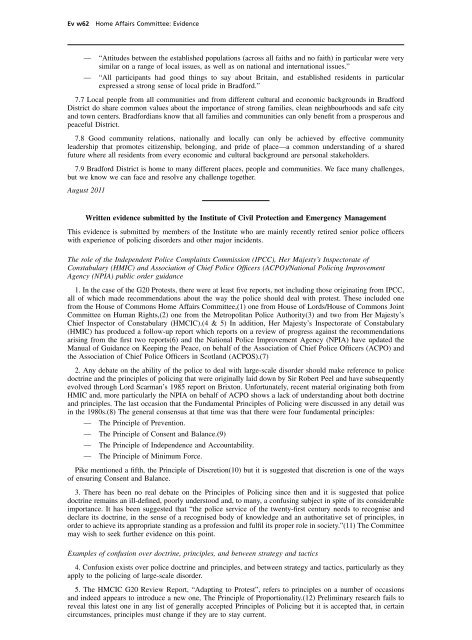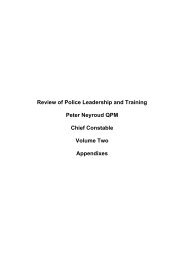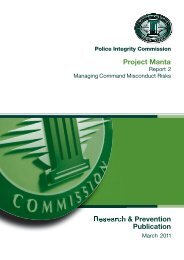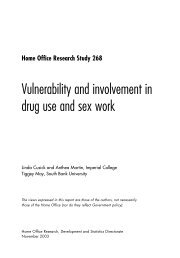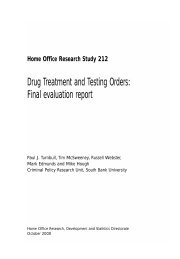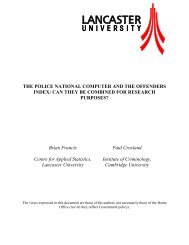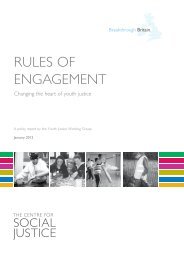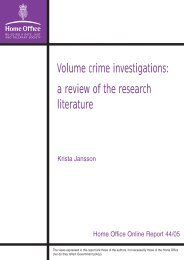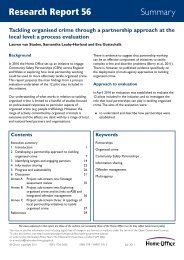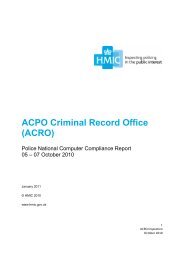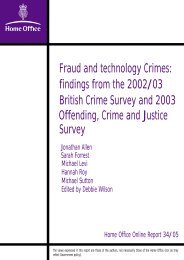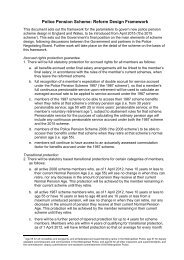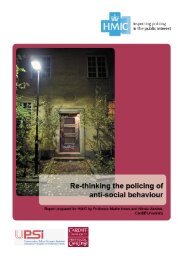Policing Large Scale Disorder: Lessons from the disturbances of ...
Policing Large Scale Disorder: Lessons from the disturbances of ...
Policing Large Scale Disorder: Lessons from the disturbances of ...
You also want an ePaper? Increase the reach of your titles
YUMPU automatically turns print PDFs into web optimized ePapers that Google loves.
Ev w62 Home Affairs Committee: Evidence<br />
— “Attitudes between <strong>the</strong> established populations (across all faiths and no faith) in particular were very<br />
similar on a range <strong>of</strong> local issues, as well as on national and international issues.”<br />
— “All participants had good things to say about Britain, and established residents in particular<br />
expressed a strong sense <strong>of</strong> local pride in Bradford.”<br />
7.7 Local people <strong>from</strong> all communities and <strong>from</strong> different cultural and economic backgrounds in Bradford<br />
District do share common values about <strong>the</strong> importance <strong>of</strong> strong families, clean neighbourhoods and safe city<br />
and town centers. Bradfordians know that all families and communities can only benefit <strong>from</strong> a prosperous and<br />
peaceful District.<br />
7.8 Good community relations, nationally and locally can only be achieved by effective community<br />
leadership that promotes citizenship, belonging, and pride <strong>of</strong> place—a common understanding <strong>of</strong> a shared<br />
future where all residents <strong>from</strong> every economic and cultural background are personal stakeholders.<br />
7.9 Bradford District is home to many different places, people and communities. We face many challenges,<br />
but we know we can face and resolve any challenge toge<strong>the</strong>r.<br />
August 2011<br />
Written evidence submitted by <strong>the</strong> Institute <strong>of</strong> Civil Protection and Emergency Management<br />
This evidence is submitted by members <strong>of</strong> <strong>the</strong> Institute who are mainly recently retired senior police <strong>of</strong>ficers<br />
with experience <strong>of</strong> policing disorders and o<strong>the</strong>r major incidents.<br />
The role <strong>of</strong> <strong>the</strong> Independent Police Complaints Commission (IPCC), Her Majesty’s Inspectorate <strong>of</strong><br />
Constabulary (HMIC) and Association <strong>of</strong> Chief Police Officers (ACPO)/National <strong>Policing</strong> Improvement<br />
Agency (NPIA) public order guidance<br />
1. In <strong>the</strong> case <strong>of</strong> <strong>the</strong> G20 Protests, <strong>the</strong>re were at least five reports, not including those originating <strong>from</strong> IPCC,<br />
all <strong>of</strong> which made recommendations about <strong>the</strong> way <strong>the</strong> police should deal with protest. These included one<br />
<strong>from</strong> <strong>the</strong> House <strong>of</strong> Commons Home Affairs Committee,(1) one <strong>from</strong> House <strong>of</strong> Lords/House <strong>of</strong> Commons Joint<br />
Committee on Human Rights,(2) one <strong>from</strong> <strong>the</strong> Metropolitan Police Authority(3) and two <strong>from</strong> Her Majesty’s<br />
Chief Inspector <strong>of</strong> Constabulary (HMCIC).(4 & 5) In addition, Her Majesty’s Inspectorate <strong>of</strong> Constabulary<br />
(HMIC) has produced a follow-up report which reports on a review <strong>of</strong> progress against <strong>the</strong> recommendations<br />
arising <strong>from</strong> <strong>the</strong> first two reports(6) and <strong>the</strong> National Police Improvement Agency (NPIA) have updated <strong>the</strong><br />
Manual <strong>of</strong> Guidance on Keeping <strong>the</strong> Peace, on behalf <strong>of</strong> <strong>the</strong> Association <strong>of</strong> Chief Police Officers (ACPO) and<br />
<strong>the</strong> Association <strong>of</strong> Chief Police Officers in Scotland (ACPOS).(7)<br />
2. Any debate on <strong>the</strong> ability <strong>of</strong> <strong>the</strong> police to deal with large-scale disorder should make reference to police<br />
doctrine and <strong>the</strong> principles <strong>of</strong> policing that were originally laid down by Sir Robert Peel and have subsequently<br />
evolved through Lord Scarman’s 1985 report on Brixton. Unfortunately, recent material originating both <strong>from</strong><br />
HMIC and, more particularly <strong>the</strong> NPIA on behalf <strong>of</strong> ACPO shows a lack <strong>of</strong> understanding about both doctrine<br />
and principles. The last occasion that <strong>the</strong> Fundamental Principles <strong>of</strong> <strong>Policing</strong> were discussed in any detail was<br />
in <strong>the</strong> 1980s.(8) The general consensus at that time was that <strong>the</strong>re were four fundamental principles:<br />
— The Principle <strong>of</strong> Prevention.<br />
— The Principle <strong>of</strong> Consent and Balance.(9)<br />
— The Principle <strong>of</strong> Independence and Accountability.<br />
— The Principle <strong>of</strong> Minimum Force.<br />
Pike mentioned a fifth, <strong>the</strong> Principle <strong>of</strong> Discretion(10) but it is suggested that discretion is one <strong>of</strong> <strong>the</strong> ways<br />
<strong>of</strong> ensuring Consent and Balance.<br />
3. There has been no real debate on <strong>the</strong> Principles <strong>of</strong> <strong>Policing</strong> since <strong>the</strong>n and it is suggested that police<br />
doctrine remains an ill-defined, poorly understood and, to many, a confusing subject in spite <strong>of</strong> its considerable<br />
importance. It has been suggested that “<strong>the</strong> police service <strong>of</strong> <strong>the</strong> twenty-first century needs to recognise and<br />
declare its doctrine, in <strong>the</strong> sense <strong>of</strong> a recognised body <strong>of</strong> knowledge and an authoritative set <strong>of</strong> principles, in<br />
order to achieve its appropriate standing as a pr<strong>of</strong>ession and fulfil its proper role in society.”(11) The Committee<br />
may wish to seek fur<strong>the</strong>r evidence on this point.<br />
Examples <strong>of</strong> confusion over doctrine, principles, and between strategy and tactics<br />
4. Confusion exists over police doctrine and principles, and between strategy and tactics, particularly as <strong>the</strong>y<br />
apply to <strong>the</strong> policing <strong>of</strong> large-scale disorder.<br />
5. The HMCIC G20 Review Report, “Adapting to Protest”, refers to principles on a number <strong>of</strong> occasions<br />
and indeed appears to introduce a new one, The Principle <strong>of</strong> Proportionality.(12) Preliminary research fails to<br />
reveal this latest one in any list <strong>of</strong> generally accepted Principles <strong>of</strong> <strong>Policing</strong> but it is accepted that, in certain<br />
circumstances, principles must change if <strong>the</strong>y are to stay current.


